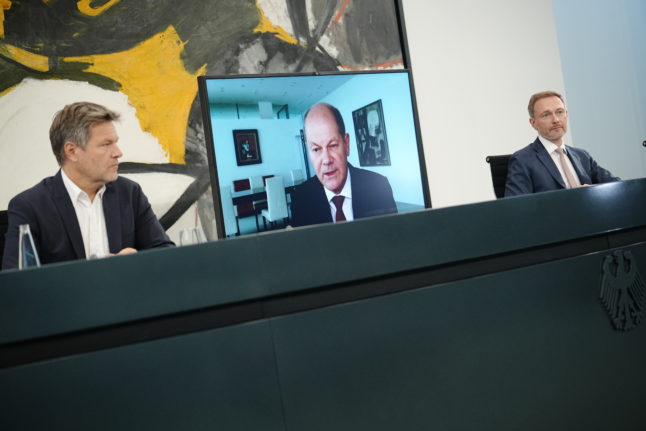The government will plough €200 billion into shielding households and businesses from skyrocketing energy costs in the wake of the Russian invasion of Ukraine.
“The German government will do everything so that prices sink,” Scholz said at a press conference via video link because he is currently isolating due to a Covid infection. He said the package includes a gas price cap and a plan to cream off windfall profits made by some energy companies.
The package is designed to ensure that Germany can contend with the fallout from rising prices “this year and next year and the one after that”, Scholz said.
As expected, the controversial gas levy plans are being shelved. The government had been planning to pass on some of the soaring costs of energy to consumers from October to prop up struggling suppliers.
READ ALSO: Will Germany set a gas price cap – and how would it work?
With electricity and gas prices spiralling upwards, the leaders of Germany’s 16 federal states on Wednesday called on the government to introduce an energy price cap.
Several other politicians – also within the government’s own traffic light coalition – had also urged for the levy to be scrapped and a price cap to be introduced.
Scholz said there should be no extra burden for consumers and companies. “With the €200 billion, we have the means to finance all of this,” he said, adding that the gas levy was no longer needed.
Protection from rising prices was needed for “pensioners, workers, families… but also bakers and craftsmen or big industrial plants that are dependent on electricity and the gas supply”, Scholz said.
Scholz pointed out that gas storage facilities in Germany are currently more than 90 percent full. “We will do everything we can to use the storage facilities for the winter,” he said.
‘Energy war’
Germany, which has been highly dependent on imports of fossil fuels from Russia to meet its energy needs, has been battling to find other sources as supplies dwindle.
Thursday’s announcement came as inflation in Germany soared to a 70-year high of 10 percent in September, according to official data, driven higher by spiking energy prices.
“We find ourselves in an energy war over prosperity and freedom,” Finance Minister Christian Lindner said at the press conference.

Protecting consumers against the rising bills was a “crystal clear answer” to Russian President Vladimir Putin that Germany was “strong economically”.
The gas price cap should cover “at least a part” of the gas used by households and businesses, while “maintaining an incentive to reduce gas use” over the winter as supplies are limited, the government said in a statement.
At the same time, the government would work to limit the price of electricity for consumers by skimming off profits made by energy firms that have profited by the higher asking prices for gas but which do not use the energy source to generate power.
The gas levy would have seen 2.4 cents per kilowatt hour added to gas bills, adding an extra burden of several hundred euros per household. The government announced it would also reduce VAT on gas consumption to seven percent, down from the usual 19 percent.
There had been major controversy over the surcharge after it emerged that some companies registered to receive a share included firms that have not been struggling in the current situation.
Economics and Climate Minister Robert Habeck admitted mistakes in the design of the levy and he had pledged to change it.



 Please whitelist us to continue reading.
Please whitelist us to continue reading.
Member comments